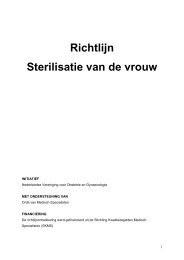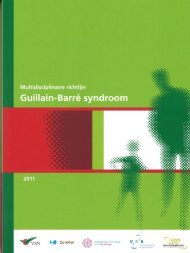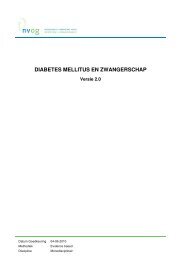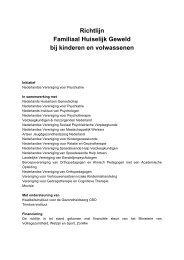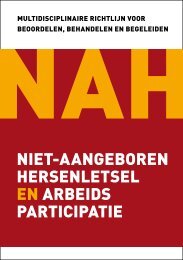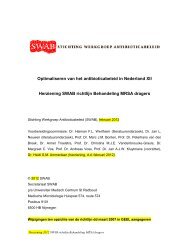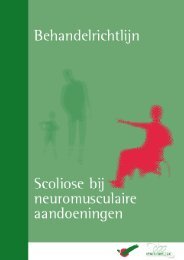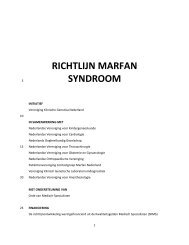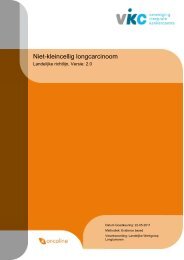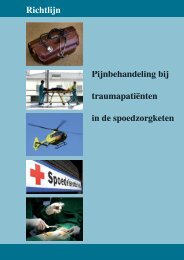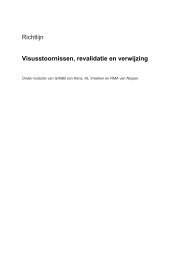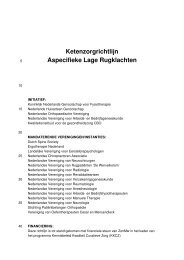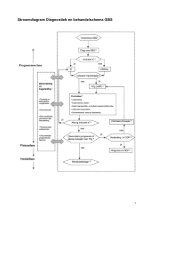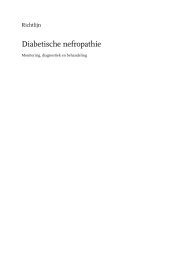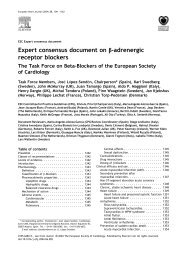Richtlijn: Otitis Externa - Kwaliteitskoepel
Richtlijn: Otitis Externa - Kwaliteitskoepel
Richtlijn: Otitis Externa - Kwaliteitskoepel
Create successful ePaper yourself
Turn your PDF publications into a flip-book with our unique Google optimized e-Paper software.
Additional oral antibiotics are not required. In most cases the choice of topical intervention does not<br />
appear to influence the therapeutic outcome significantly. Any observable differences in efficacy<br />
were minor and not consistently present at every assessment point.<br />
Evidence from one trial (Sabater 1996) of low quality found no difference in clinical efficacy between<br />
quinolone and non-quinolone drops. Quinolones are more expensive than non-quinolones. This<br />
finding may influence their use in cost-driven and resource-poor settings. If treatment needs to be<br />
extended beyond one week acetic acid alone appears to perform less well when compared against<br />
other topical treatments. One high quality trial (van Balen 2003) compared acetic acid with<br />
antibiotic/steroid drops; although the cure rate was comparable at day seven to nine it was poorer in<br />
the acetic acid group at weeks two and three. A separate trial, of low quality, showed that acetic acid<br />
spray had a poorer cure rate than acetic acid/antibiotic/steroid spray at two and four weeks (Slack<br />
1987). Acetic acid is available in many countries as a non-prescription remedy at low-cost, in both<br />
drop and spray form. The manufacturer recommends using it for a maximum of seven days. The<br />
results from van Balen 2003 support their use for this duration. However, their study also showed<br />
that symptoms were more prolonged in the acetic acid group (eight days versus six days in the<br />
antibiotic/steroid group); this may influence the decision to use acetic acid in primary care.<br />
There is some evidence which indicates that patients treated with topical antibiotics containing<br />
steroid benefit from a reduction of swelling (Mosges 2008), severe redness, secretion and analgesic<br />
consumption (Mosges 2007) compared to their non-steroid counterpart.<br />
There is a suggestion that high-potency steroids may be more effective than low-potency steroids (in<br />
terms of severe pain, inflammation and swelling) (Roland 2007). Further investigation is required.<br />
Evidence from one low quality trial (Masood 2008) suggests a glycerine-ichthammolmedicated wick<br />
may provide better pain relief in early severe acute otitis externa than a<br />
triamcinolone/gramicidin/neomycin/nystatin medicated wick, but the magnitude or precision of<br />
effect has yet to be established.<br />
In general, given the apparent parity in clinical efficacy of topical interventions used to treat acute<br />
otitis externa, other factors such as cost, availability, dosing regimen, risk of contact sensitivity, risk<br />
of resistance and risk of ototoxicity may determine the choice of therapy. Parameters such as speed<br />
of healing and pain relief are yet to be determined for many topical treatments and may also<br />
influence this decision. Clinicians should use a topical drop that is efficacious for diffuse AOE.<br />
Conclusies<br />
Level of evidence 1<br />
Rosenfeld 2006<br />
Kaushik 2010<br />
Level of evidence 1<br />
Rosenfeld 2006<br />
Level of evidence 1<br />
Kaushik 2010<br />
There is no difference in effectiveness between quinolone and non-quinolone<br />
for the treatment of AOE.<br />
There is no difference in effectiveness between antiseptic and antibiotic<br />
topical treatment for the treatment of AOE.<br />
There is no difference in effectiveness between antibiotic/steroid vs<br />
antiseptic for the treatment of AOE.<br />
26 <strong>Richtlijn</strong> <strong>Otitis</strong> <strong>Externa</strong> 2010<br />
Nederlandse Vereniging voor Keel-Neus-Oorheelkunde en Heelkunde van het Hoofd-Halsgebied



